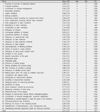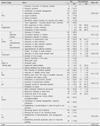Abstract
Purpose
This study was conducted to develop an evaluation framework for QI activity in medical institutions and to analyze QI activity cases by applying the developed evaluation framework.
Method
A four-phase process was employed to develop the evaluation framework, and a descriptive survey was used for the QI case study. Data were collected in April, 2010 by examining 157 QI activity cases presented at conferences and published in Journal of Korean Society of Quality Assurance in Health Care over the past three years. Developed QI activity evaluation instruments were used for data collection. Data were analyzed using the SPSS 18.0 for Windows program.
Result
A QI Activity Evaluation Framework was developed. This framework consisted of 45 items. The department with the highest level of QI participation was the nursing department. The most frequent QI activity theme was patient safety. QI activity levels in Korean medical institutions are relatively equalized without significant differences according to institution characteristics.
Figures and Tables
References
1. Barsness ZI, Shortell SM, Gillies RR, Hughes EFX, O'Brien JL, Bohr D, Izui C, et al. The Quality March: National survey of hospital quality improvement activities. Hosp Health Netw. 1993. 12. 05. 67(23):52–55.
2. Brook RH. The end of the quality improvement movement: Long live improving value. JAMA. 2010. 304(16):1831–1832. doi: 10.1001/jama.2010.1555.
3. Chae YM, Lee SH, Choi KS. Study on quality improvement activities in Korean hospitals. J Korean Soc Qual Assur Health Care. 2001. 8(2):232–243.
4. Cho SH, Kim HJ, Kim CY. Quality improvement activities in Korean hospitals. J Korean Soc Qual Assur Health Care. 1997. 4(2):196–209.
5. Cho WH. QI concept and method in medical institution & understanding of CQI. Hospital management outcome evaluation. 2000. In : Symposium conducted at the scientific meeting of the Korea Society of Hospital Administration; Seoul, Korea.
6. Choi JH. (The) Performance of QI programs in general hospitals. 2003. Seoul: Yonsei University;Unpublished master's thesis.
7. Choi KS, Lee SH, Cho WH, Kang HY, Chae YM. Succeeding factors and barriers to implementing quality improvement programs. J Korean Soc Qual Assur Health Care. 2001. 8(2):146–159.
8. Ernst & Young Global Limited. International quality study: Health industry report. 1992. Cleveland: The American Quality Foundation.
9. Graham NO.
CB Kim
TO Yoo
GO Koh
H Choi
JA Lee
. Quality in health care: Theory, application, and evolution. 2001. Seoul: Gyechukk Munhawasa.
10. Han YJ. Awareness and attitude of medical personnel for the activities to improve medical quality in a university hospital. 2003. Cheonan: Dankook University;Unpublished master's thesis.
11. Hyun SK. (A) Study on the follow-up management system of continuous quality improvement activity. 2002. Seoul: Yonsei University;Unpublished master's thesis.

12. Hong AR. (A) Study on the effect of quality improvement activities in healthcare organizations. 2005. Nonsan: Konyang University;Unpublished master's thesis.

13. Hwang JH. Quality improvement activity in hospitals and its acceptance among hospital personnels quality assurance, hospital personnels. J Korean Soc Qual Assur Health Care. 1996. 3(2):86–97.
14. Joint Commission on Accreditation of Healthcare Organization. Striving toward improvement: Six hospital in search of quality. 1992. Chicago: JACHO.
15. Koo IS, Kim TS. A Study on the effective guide of quality small group activity in Korea. J Namseoul Univ. 2005. 11(2):37–50.
16. Lee KI, Kim H. A suggestion on the promotive directions of quality circle activity. J Korean Soc Quality Manage. 2007. 35(2):1–26.
17. Lee SI. Attitudes toward quality improvement activities of QA committee member physicians in Korean university hospitals. J Korean Soc Qual Assur Health Care. 1998. 5(1):76–91.
18. Lee SI. Country status and challenges of the activities of the hospital quality improvement. J Korean Hosp Assoc. 2003. 32(2):36–41.
19. Lee SH. Factors associated with the degree of quality improvement factors associated with the degree of quality improvement performance. Korean J Health Policy Adm. 2001. 11(4):54–69.
20. Lee SH, Chae YM, Jee YK, Choi KS. A study on quality improvement activities in Korean hospitals. J Korean Soc Qual Assur Health Care. 2001. 8(2):172–185.
21. Maguerez G, Erbault M, Terra JL, Maisonneuve H, Matillon Y. Evaluation of 60 continuous quality improvement projects in French hospitals. Int J Qual Health Care. 2001. 13(2):89–97. doi: 10.1093/intqhc/13.2.89.
22. Massoud R, Askov K, Reinke J, Franco LM, Bornstein T, Knebel E, Macaulay C.
SI Lee
. Modern paradigm for improving healthcare quality. 2004. Seoul: Han Hak Munhasa;(Original work published 2001).
23. Melum MM, Sinioris ME. Total quality management in health care: Taking stock. Qual Manag Health Care. 1993. 1(4):59–63.
24. Oh KY. (A) Study on the activation of quality improvement using an effective guidance of quality control circles. 2003. Jeonju: Jeonju University;Unpublished master's thesis.
25. Stoltz PK. FOCUS-PDCA. Today's Management Methods. 1996. 223–244.
26. Tak KC. Research on the total quality management (TQM) of the general hospitals. 2002. Daegu: Kyungsan University;Unpublished doctoral dissertation.
27. The Korean Society of Quality Assurance in Health Care. Annual fall meeting of the Korean Society of Quality Assurance, seminar handout II. 2007a, 2008a, 2009a. Seoul: The Korean Society of Quality Assurance in Health Care.
28. The Korean Society of Quality Assurance in Health Care. J Korean Soc Qual Assur Health Care. 2007b, 2008b, 2009b. Seoul: The Korean Society of Quality Assurance in Health Care.
29. The Korean Society of Quality Assurance in Health Care. Oral session presentation data of Scientific Meeting. 2010. 04. 20. Retrieved June 25, 2010. from: http://www.kosqua.net/?sub=pub&sub2=2c# clk.
30. Yun TY. Study on the change of tools at quality circle activities in Korea. 2007. Taejon: Hannam University;Unpublished master's thesis.




 PDF
PDF ePub
ePub Citation
Citation Print
Print






 XML Download
XML Download